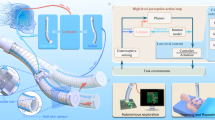Abstract
The paper discusses an innovative approach to acquire and learn deformable objects’ properties to allow the incorporation of soft objects in virtualized reality applications or the control of dexterous manipulators. Contours of deformable objects are tracked in a sequence of images collected from a camera and correlated to the interaction measurements gathered at the fingers of a robotic hand using a combination of unsupervised and supervised neural network architectures. The advantage of the proposed methodology is that it not only automatically and implicitly captures the real elastic behavior of an object regardless of its material, but it is also able to predict the shape of its contour for previously unseen interactions. The results obtained show that the proposed approach is fast, insensitive to slight changes in contrast and lighting, and able to model accurately and predict severe contour deformations.
Access this chapter
Tax calculation will be finalised at checkout
Purchases are for personal use only
Preview
Unable to display preview. Download preview PDF.
Similar content being viewed by others
References
Petriu, E.M.: Neural Networks for Measurement and Instrumentation in Virtual Environments. In: Ablameyko, S., Goras, L., Gori, M., Piuri, V. (eds.) Neural Networks for Instrumentation, Measurement and Related Industrial Applications. NATO Science Series III: Computer and System Sciences, vol. 185, pp. 273–290. IOS Press, Amsterdam (2003)
Cretu, A.-M., Payeur, P., Petriu, E.M., Khalil, F.: Deformable Object Segmentation and Contour Tracking in Image Sequences Using Unsupervised Networks. In: Canadian Conference Computer and Robot Vision, pp. 277–284. IEEE Press, Ottawa (2010)
Wang, H., Wang, Y., Esen, H.: Modeling of Deformable Objects in Haptic Rendering System for Virtual Reality. In: IEEE Conference on Mechatronics and Automation, pp. 90–94. IEEE Press, Changchun (2009)
Luo, Q., Xiao, J.: Modeling and Rendering Contact Torques and Twisting Effects on Deformable Objects in Haptic Interaction. In: IEEE International Conference on Intelligent Robots and Systems, pp. 2095–2100. IEEE Press, San Diego (2007)
Zhong, Y., Shirinzadeh, B., Alici, G., Smith, J.: Cellular Neural Network Based Deformation Simulation with Haptic Force Feedback. In: Workshop Advanced Motion Control, pp. 380–385. IEEE Press, Turkey (2006)
Greminger, M., Nelson, B.J.: Modeling Elastic Objects with Neural Networks for Vision-Based Force Measurement. In: International Conference on Intelligent Robots and Systems, pp. 1278–1283. IEEE Press, Las Vegas (2003)
Xia, Y., Wang, J., Fok, L.M.: Grasping-Force Optimization for Multifingered Robotic Hands Using Recurrent Neural Network. IEEE Trans. Robotics Automation 26(9), 549–554 (2004)
Pedreno-Molina, J., González, A.G., Moran, J.C., Gorce, P.: A Neural Tactile Architecture Applied to Real-time Stiffness Estimation for a Large Scale of Robotic Grasping Systems. Intelligent Robot Systems 49(4), 311–323 (2007)
Howard, A.H., Bekey, G.: Intelligent Learning for Deformable Object Manipulation. Autonomous Robots 9(1), 51–58 (2000)
Foresti, G.L., Pellegrino, F.A.: Automatic Visual Recognition of Deformable Objects for Grasping and Manipulation. IEEE Trans. Systems, Man Cybernetics 34(3), 325–333 (2004)
Chella, A., Dindo, H., Matraxia, F., Pirrone, R.: Real-Time Visual Grasp Synthesis Using Genetic Algorithms and Neural Networks. In: Basili, R., Pazienza, M.T. (eds.) AI*IA 2007. LNCS (LNAI), vol. 4733, pp. 567–578. Springer, Heidelberg (2007)
Author information
Authors and Affiliations
Editor information
Editors and Affiliations
Rights and permissions
Copyright information
© 2010 Springer-Verlag Berlin Heidelberg
About this paper
Cite this paper
Cretu, AM., Payeur, P., Petriu, E.M. (2010). Learning and Prediction of Soft Object Deformation Using Visual Analysis of Robot Interactions. In: Bebis, G., et al. Advances in Visual Computing. ISVC 2010. Lecture Notes in Computer Science, vol 6454. Springer, Berlin, Heidelberg. https://doi.org/10.1007/978-3-642-17274-8_23
Download citation
DOI: https://doi.org/10.1007/978-3-642-17274-8_23
Publisher Name: Springer, Berlin, Heidelberg
Print ISBN: 978-3-642-17273-1
Online ISBN: 978-3-642-17274-8
eBook Packages: Computer ScienceComputer Science (R0)




